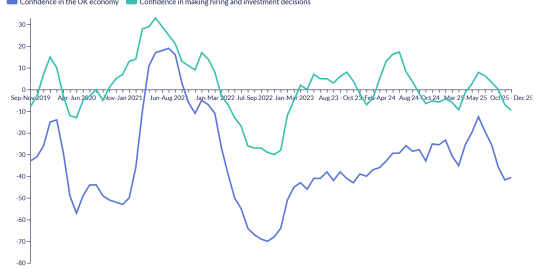The nine point (eight percent) January decline in the Monster Employment Index is widely attributed to seasonal factors that inform hiring and related online recruitment activity at the start of each year. Comparatively, the overall EU Index fell by seven points (seven percent) in January.
The UK Index matched its January 2009 level, exiting from a state of annual decline that extends back to November 2008. In contrast, the overall EU Index was down by 12 percent year-on-year. The long-term growth in administrative and organisation sector and HR signalled an upswing in demand trends for office support services, lending further evidence that business activity is reviving.
The Monster Employment Index Europe is a monthly analysis of millions of online job opportunities culled from a large, representative selection of corporate career sites and job boards across the European Union, including Monster.co.uk.
“Despite a seasonal fall during January, the long term annual growth rate of the Index continues to improve,” commented Julian Acquari, Managing Director at Monster UK and Ireland. “There was encouraging growth for business support functions such as administration, organisation and HR, which point to more confidence in taking on workers to plan for growth. Whilst business conditions are likely to remain challenging for some time, it is encouraging to see some stabilization in long-term hiring trends.”
Majority of sectors register seasonal slowdowns; opportunities increase most in the arts, entertainment, sports, leisure sector
Production, manufacturing, maintenance and repair saw a retracement in online hiring activity levels in January, following a steep run-up during the final months of 2009. Still, the sector has the highest year-on-year growth in the Index, due in part to the continued migration toward online advertising/recruiting for traditional blue-collar positions by sector employers.
Technical services including engineering; and research and development are exhibiting some of the weakest annual trends in the Index, with year-on-year declines of 31 percent and 18 percent respectively.
However, despite the overall fall, five of the industry sectors monitored by the Index registered a rise in online activity between December and January, with ten sectors displaying positive annual growth. Arts, entertainment, sports, leisure led the way in growth, with a six point (five percent) increase in the January Index, reflecting broad expansion in online job availability in the consumer-driven sector.
Administrative, organisation also recorded monthly growth, with a two point (two percent) rise. Annually, the sector has risen by 20 percent, indicating a much improved job market for office support services relative to the a year ago. The HR sector is showing a similarly strong annual trend in the Index.
Clerical support workers registers upturn
Online job demand strengthened only one occupational group monitored by the Index in January. Clerical support workers saw a rise in opportunities on the month, jumping four points (three percent) as well as achieving the most rapid annual growth, up 43 percent.
The Skilled agricultural, forestry and fishery workers group registered the greatest year-on-year decline, with a drop of 33 points (17 percent). Professionals also saw a steep drop year-on-year, with a 16 point (14 percent) decline.
Seasonal declines observed in all regions
All UK regions registered an easing in online job availability between December and January. Midlands exhibited the mildest rate of slowdown in January, falling by one point (one percent) on the month. The region has seen demand expand nearly every month since last summer.
London also edged down by one point (one percent), while Wales fell by six points (three percent) on the month. Annually, both regions are showing positive growth.
South East and East Anglia saw online recruitment activity recede most from their elevated December levels, dropping nine points (nine percent) and 14 points (13 percent) respectively.
Wales saw the greatest increase over the year, climbing 42 points (23 percent) since January 2009.





